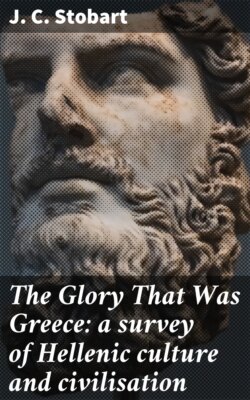Читать книгу The Glory That Was Greece: a survey of Hellenic culture and civilisation - J. C. Stobart - Страница 10
На сайте Литреса книга снята с продажи.
Crete, the Doorstep of Europe
ОглавлениеTable of Contents
We are to picture the primitive tribes of the world as continually moving under the double pressure of the wolf in their bellies and the enemy at their backs—moving, in the main, north and west, as climatic conditions relented before them. So long as they were in this nomadic stage little progress could be made in civilisation; tents must form their houses, and their goods could be only such trifles of necessary pots and pans as they could carry. But when the moving tribe reached the sea it was compelled to halt and settle. Thus it is that civilisation begins in the oases of the desert, on the north coasts of Africa, and in the isles of Greece. Settled by force, and to some degree protected by nature, they could begin to accumulate possessions, and to improve them with art. They could begin to build houses, and develop morals and polities.
Thus geography has made it exceedingly probable that Crete will play a momentous part in the earliest history of Europe. That island lies like a doorstep at the threshold of Europe. If civilisation was to rise with the sun in the East, out of the extremely ancient civilisations of Egypt and Babylon, by way of those earliest carriers to the world’s markets, the Phœnicians of Tyre and Sidon, clearly this island of Crete would be their stepping-stone to Europe. Thus we reason, knowing it to be the truth. But we should never have learnt the truth from literature. In Homer, for example, Crete is of little importance. It was famous for its “ninety cities” and its mixed nationalities, and it was known as the former realm of Minos. There, too, the father of all craftsmen, Dædalus, had fashioned a wondrous dancing-place. But we might almost gather from the pages of Homer that it was a land whose glory had departed already. And that is the truth. Outside Homer, Crete, though insignificant in history, takes a much more important place in mythology and legend. For religion Crete was the birthplace of Zeus, the king of the gods. In the history of law-making it plays a very important part, for Minos of Crete was said to be the first law-giver, and he was placed as the judge of the dead by later mythology. In religion it produced Epimenides, the early exorcist, and in music Thaletas. Then many ancient historians give us a tradition of early naval empires in Greek waters. Thalassocracies they were called, and that of Crete stands at the head of the list. Finally, those fortunate Englishmen whose introduction to Greece has come through the wonderful “Heroes” of Charles Kingsley know the story of the Cretan labyrinth and that fearsome beast the Minotaur. They know the story of Theseus: how the Athenians of the earliest times had to send tribute every year of their fairest youths and maidens to King Minos of Crete, until one year the prince Theseus besought old Ægeus, his royal father, to let him go among the number in order to stop this cruel sacrifice; how he went at last, and how the Cretan princess, Ariadne, loved him and gave him a weapon and a clue to the labyrinth, and how he slew the dreadful monster and deserted his princess and returned home; but how he forgot also to hoist the signal of his safety, so that the old king, seeing black sails to his ship, cast himself headlong from the rock in his misery, and gave a name to the Ægean Sea. In old days we read it as a beautiful Greek romance; now we think it very likely that the Athenians in early days did have to pay tribute—
